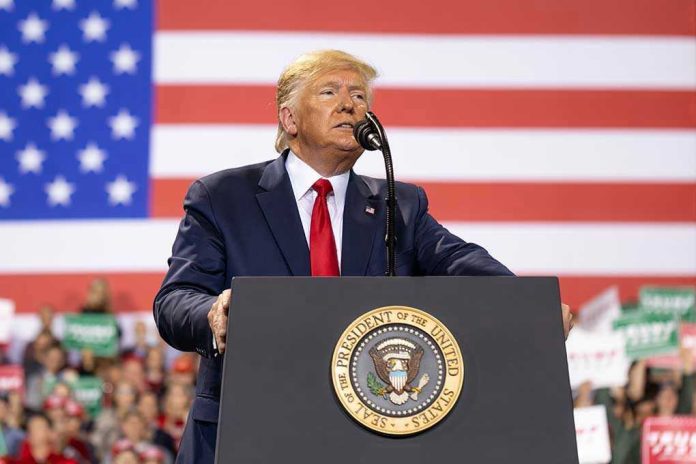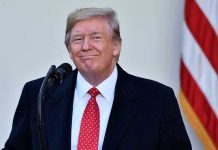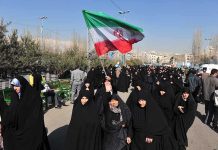
When a sitting American president calls a foreign leader a “drug leader” and threatens to “close up” an entire nation’s killing fields, the world is forced to ask: Have decades of international diplomacy just been upended in a single moment?
Story Snapshot
- Trump accuses Colombia’s president of being an “illegal drug leader” and publicly threatens US intervention.
- US ends financial aid to Colombia, escalating diplomatic tensions to unprecedented heights.
- Colombian President Gustavo Petro rejects the charges and defends his country’s record.
- The dispute centers on narcotics policy, a controversial Caribbean maritime incident, and shifting power dynamics.
Trump’s Accusation and Its Immediate Fallout
On October 19, 2025, Donald Trump stepped before the press and dropped a verbal bomb: labeling Colombia’s President Gustavo Petro an “illegal drug leader” and announcing the abrupt end of all US aid to Colombia. The language was unfiltered, personal, and direct—a sharp break from the formal, diplomatic tones that typically characterize international relations. Trump’s assertion did not stop at accusations; he warned that, unless Colombia “closed up these killing fields,” the United States would intervene, with the chilling caveat, “It won’t be done nicely.” This public statement marked a new low in US-Colombia relations and signaled a major shift in how the US might approach its foreign policy in Latin America.
Within hours, the implications of Trump’s remarks reverberated across both continents. US financial aid, a critical lifeline for Colombian counter-narcotics and security operations, was suspended. Colombian government officials scrambled to respond, while US agencies began contingency planning for a potential standoff. The timing was no accident—tensions had been mounting after the US “decertified” Colombia as a reliable partner in the war on drugs just weeks earlier, citing rising cocaine production and a controversial maritime incident in the Caribbean. Trump’s statement brought these simmering frustrations to a boil, turning policy disputes into personal attacks.
The Colombian Response and the Battle for Sovereignty
On October 20, Colombian President Gustavo Petro issued a formal reply, denying Trump’s charges and defending his administration’s record. Petro framed the dispute as a problem with Trump personally, rather than the United States as a whole, and reaffirmed Colombia’s commitment to reforming drug policy. Petro’s approach to narcotics control has consistently favored social and economic solutions over militarized crackdowns, a philosophy that has clashed with US priorities for decades. The immediate loss of American aid threatened Colombia’s capacity to manage security, but Petro’s defiance struck a chord with nationalist sentiments, fueling anti-US rhetoric and calls for greater autonomy.
The incident that partly triggered Trump’s outburst—a disputed maritime encounter in the Caribbean—remained contentious. US officials alleged the targeted boat had rebel ties, while Petro’s government insisted it was a civilian vessel caught in the crossfire. This ambiguity only deepened mistrust and amplified the stakes, as both nations struggled to control the narrative.
Long-Term Implications: Policy, Politics, and Power Shifts
Suspension of US aid created immediate disruptions for Colombia’s security forces and anti-narcotics programs. Rural communities involved in coca cultivation faced renewed uncertainty, and fears mounted that drug trafficking could escalate if cooperation collapsed. Politically, the episode emboldened hardliners and populists on both sides, with Trump’s tough rhetoric playing well to domestic audiences and Petro leveraging the crisis to strengthen his position at home. Economically, the loss of US funding jeopardized development projects and strained Colombia’s already tight budget, while socially, the dispute sowed anxiety and division in affected regions.
Broader consequences loom over the international counter-narcotics effort. Analysts warn that Trump’s confrontational approach risks unraveling decades of bilateral collaboration, potentially increasing instability and drug production in the region. Experts in US-Latin American relations caution that personalizing diplomatic disputes undermines trust, and many highlight the need for multilateral strategies to address drug trafficking and violence. Opinions in the US are divided—some support Trump’s aggressive stance, arguing that Colombia has not done enough to stem the flow of cocaine, while Colombian commentators overwhelmingly reject the accusations as politically motivated and counterproductive.
Verification and Contradictions: The Facts Behind the Rhetoric
Major international news outlets and official statements corroborate the timeline and substance of the diplomatic standoff. Trump’s statements and Petro’s response have been consistently reported across reputable platforms. However, no credible evidence supports Trump’s claim that Petro is personally involved in drug trafficking; these allegations are widely regarded as political rhetoric intended to shift blame and project strength. The dispute over the Caribbean incident remains unresolved, with each side presenting conflicting accounts. The ultimate impact of Trump’s threats—whether they lead to direct intervention, policy realignment, or mere political theater—will depend on the actions of both leaders and the resilience of bilateral ties.
As this saga unfolds, the world watches to see whether a single moment of rhetorical escalation will reshape decades of drug policy, diplomacy, and the delicate balance of power in Latin America.
Sources:
Yeni Şafak: Colombian president responds to Trump’s ‘drug leader’ accusations




